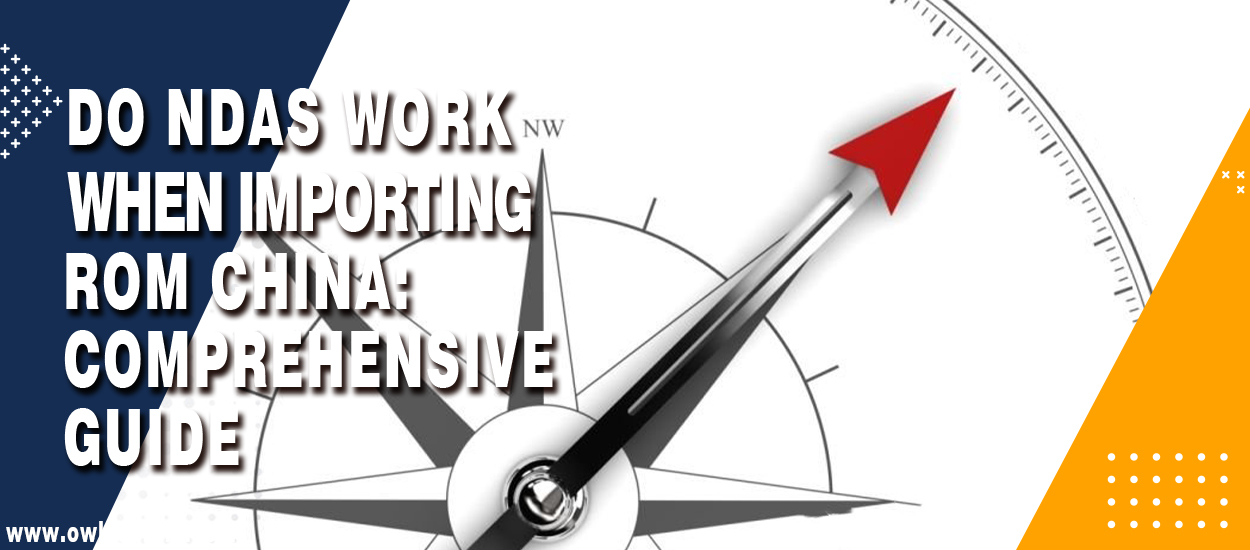Estimated reading time: 11 minutes
Do NDAs work when importing from China? Yes, NDAs signed when you buy from China are effective. These documents can protect your intellectual property and sensitive information about your products.
In this blog post, we will provide you with a comprehensive guide about NDAs to help you understand more about NDAs when importing from China.
Additionally, within this article, we will provide you with a template for an NDA, which you can download for your own use!
Do NDAs Work When Importing from China?
If you’re wondering, “Do NDAs work when importing from China?” the answer is yes, but only if done correctly.
A well-drafted manufacturing NDA tailored to the Chinese legal system can be a very effective means of protecting your intellectual property.
An NDA, or Non-Disclosure Agreement, is a legal contract that will prevent your supplier from divulging or misusing proprietary information regarding your products, designs, or business methods.
Not all NDAs are created equal, however, when manufacturing abroad. A typical NDA will not be enforceable in Chinese courts.
You need a professionally written China NDA based on local legal standards.
Understanding how an NDA China approach differs from Western agreements is essential for you to maintain control of your manufacturing process.
You’ve found the right place if you’ve been asking “whats is an NDA“, or if you simply need solid information on NDAs and China sourcing.
At Owlsourcing, we walk you through legal protections like NDAs as we streamline your supply chain for efficiency.
Ready to safeguard your next big idea? Contact us today to start with the right strategy for safe importing.
What is an NDA?
NDA stands for “Non-Disclosure Agreement”. It is a legal contract between two or more parties where the parties agree to keep certain information confidential.
It is commonly used to protect sensitive information, trade secrets, or proprietary data from being disclosed publicly or to competitors.
Tip: Key points about NDA

- The primary purpose of an NDA is to protect sensitive information from being disclosed to unauthorized parties.
- NDAs specify how long the receiving party must keep the information confidential.
- NDAs are legally enforceable contracts.
- An NDA cannot keep all information confidential indefinitely. It should reasonably define the scope and period of confidentiality, and it cannot cover publicly known information or information independently developed.
- The effectiveness and enforceability of an NDA can depend on the legal jurisdiction in which it is made. Different countries and states have varying laws regarding NDAs.
Do Non-Disclosure Agreements (NDAs) hold up in court?
Yes! Non-Disclosure Agreements (NDAs) are legally binding contracts and can hold up in court, provided they are well-drafted and meet certain legal criteria.

However, please be aware that certain specific factors may render your NDA unenforceable. As mentioned, it needs to be well-drafted and conform to legal standards.
If the NDA is vague about what constitutes confidential information or covers an overly broad scope, it may be considered too ambiguous to be legally effective.
Moreover, the NDA must comply with local legal provisions. An NDA intended to cover up illegal activities or other unethical conduct is unenforceable. Courts will not support agreements that facilitate illegal actions.
What are the types of NDAs and their applicability?
1. Unilateral NDA
A unilateral NDA requires only one party to agree to maintain the confidentiality of certain information.
This kind of NDA is typically used when the disclosing party shares sensitive or proprietary information with the receiving party but does not receive any confidential information in return.
Applicability of Unilateral NDA,
A) Business Discussions: Commonly used in initial business discussions where a company reveals trade secrets, business plans, or other sensitive information to potential partners, investors, or employees, without receiving any confidential information in return.
B) Product Development: Useful for companies sharing details about a new product or technology with suppliers, consultants, or contractors, where the information is one-sided and needs protection.
When you are unsure whether these companies are worthy of collaboration, do not provide all your confidential information. Moreover, a request to sign a unilateral non-disclosure agreement.
2. Bilateral NDA

A bilateral NDA requires both the disclosing party and the receiving party to agree to exchange and maintain the confidentiality of sensitive information.
In this arrangement, each party acts as both a discloser and a recipient of confidential information.
If you have the other party’s confidential information, they are unlikely to easily disclose your information. For them, it would be a situation where both parties stand to lose.
Applicability of Bilateral NDA,
A) Joint Ventures and Partnerships: Used in scenarios where two companies or entities are considering a partnership or joint venture and need to share business strategies, financial data, trade secrets, or technological know-how.
Note: After a corporate merger or acquisition, it becomes necessary to gain a deep understanding of each other’s business, which will involve sensitive information from both parties. At this point, both parties can opt to sign a bilateral NDA.
B) Collaborative Research and Development: Common in collaborative R&D projects where two or more parties are working together to develop new products or technologies and need to share proprietary data or techniques.
C) Supply Chain Relationships: In supply chain or manufacturing relationships, companies might need to exchange information about product designs, manufacturing processes, and logistics.
3. Multilateral NDA
A Multilateral NDA, also known as a Multi-Party NDA, is a type of Non-Disclosure Agreement that involves three or more parties.
In this arrangement, at least one party discloses confidential information to the other parties, and all parties agree to protect this information from further disclosure.
Applicability of Multilateral NDA,
A) Multilateral NDA involves three or more parties where at least one party discloses confidential information to the others.
This is suitable for complex business transactions involving multiple stakeholders, reducing the need for multiple bilateral NDAs.
Why are NDAs important When Importing from China?
When importing from China, NDAs are one of the methods to help you verify Chinese suppliers’ legitimacy.
They assist you in choosing trustworthy Chinese suppliers. Besides, legitimate NDAs can comprehensively protect your business interests and ensure the smooth running of your operations.
Protecting intellectual property
When you source products from China, especially those involving unique designs or proprietary technology, be mindful of protecting your intellectual property.
An NDA ensures that your Chinese suppliers or manufacturers will not replicate or use your intellectual property for their purposes, or share it with others.
This is particularly important considering the significant investment companies make in developing unique products and designs.
Many businesses have suffered intellectual property theft by Chinese suppliers due to not considering the role of NDAs.
Note: You need to pay close attention to the protection of intellectual property when sourcing in China.
Some Chinese suppliers might appreciate your product design and register the patent in China, claiming it as their design.
The consequence is that you can only buy the product from these suppliers unless you alter the product’s specifications. But these products shouldn’t belong to them! It’s your product design! (Very angry)
Safeguarding Trade Secrets

Trade secrets are a valuable asset for any business. When importing from China, an NDA helps protect these secrets, which might include manufacturing processes, formulas, or client lists.
This is critical for maintaining a competitive edge, as the leakage of trade secrets can erode market advantage and benefit competitors.
Preventing unauthorized disclosure
NDAs legally bind the Chinese supplier or partner to not disclose any sensitive information related to your business.
This could include manufacturing techniques, supply chain details, financial information, or business strategies.
If they disclose any content mentioned in the agreement without your permission, you have the right to take legal action in court based on the NDA.
We provide a basic template for an NDA, and of course, you can download it for free.
How do NDAs Work?

An NDA specifically identifies which information is considered confidential, ensuring clarity and precision in the agreement.
Additionally, the agreement outlines the responsibilities of the receiving party, which usually include not disclosing the information to third parties and using it only for agreed-upon purposes.
The specific details need to be determined through negotiation between both parties.
Please note that the NDA needs to clearly state the timeframe for which the information must remain confidential, essentially the duration of the agreement’s validity.
This period can be finite or indefinite, depending on the nature of the information and the terms of the agreement.
Even after signing an NDA, there are circumstances under which the receiving party may disclose information. This could be with the consent of the disclosing party or due to legal obligations.
Pros and Cons of NDAs in Importing from China

1. Pros of NDAs in Importing from China,
Protection of Intellectual Property: NDAs help protect your intellectual property, such as designs, business strategies, or trade secrets, from being copied or misused by Chinese suppliers or manufacturers.

Legal Recourse: In case of a breach of the NDA, you have legal grounds to seek recourse. This can include compensation for damages or injunctions to stop further misuse of the information.
Building Trust: NDAs can establish a formal basis for trust between you and your Chinese partners by creating a legal obligation to maintain confidentiality.
Clarity in Business Relationships: An NDA provides clear guidelines about what information is confidential, how it should be handled, and the consequences of breach, which brings transparency and understanding to business relationships.
2. Cons of NDAs in Importing from China,
Cultural Differences: There can be differences in understanding and interpreting legal documents due to cultural and language barriers. These differences might affect the effectiveness of the NDA.
Cost and Time: The process of drafting, negotiating, and enforcing an NDA can be time-consuming and costly. This includes legal fees for ensuring the NDA complies with Chinese law and is enforceable in China.

Addressing Common Misconceptions about NDA work
Are NDAs only applicable to large companies?
Many people believe that NDAs are only suitable for large enterprises, but this is not the case.
Because large companies are often involved in significant business transactions, reports about NDAs related to these large corporations are more likely to be seen by the public, strengthening the association between NDAs and big companies.
This can easily lead to the misconception that NDAs are only applicable to large firms.
Contrary to common belief, Non-Disclosure Agreements (NDAs) are not exclusive to large corporations. They are equally applicable and beneficial to businesses of all sizes, including small and medium-sized enterprises, startups, and even individual freelancers or contractors.
Take Owlsourcing as an example. When we receive product samples from our clients, we assist them in formulating an NDA with the supplier concerning that product.
We do not differentiate whether you are a large or a small-to-medium-sized company. Owlsourcing helps you source in China and utilizes NDAs to protect your intellectual property.

What happens if you break an NDA?
This could lead to very negative consequences. It might even result in legal liabilities, fines, or worse scenarios.
The specific penalties depend on the NDA you have signed. A legally binding NDA will include clauses for penalties in case of breach.
Generally, this involves compensating for any financial losses caused by the breach. Of course, this is the simplest form of penalty.
If your actions result in severe and irreparable consequences, it may require court litigation to resolve the issue.

However, this is not beneficial for either party involved in the cooperation.
A breach of the NDA by one party can lead to the failure of the collaboration and negatively impact the company’s reputation, significantly affecting future trade operations.
More Related Articles:
Final Thoughts on NDAs
For companies needing to protect sensitive information, trade secrets, or proprietary data from being publicly disclosed or leaked to competitors, signing NDAs with Chinese suppliers can ensure the security of your intellectual property. Of course, it’s not just large companies that can sign NDAs.
If you are interested in importing products from China or are considering it, you can email Owlsourcing at [email protected].
We assist you with everything from sourcing to shipping and help you verify Chinese suppliers’ legitimacy before signing NDAs to protect your intellectual property.
If you wish to collaborate with us or have any questions about this blog post, please feel free to contact us.



4 thoughts on “Do NDAs Work When Importing from China: Comprehensive Guide”
When is the best time to implement an NDA in the importing process?
Hi Josephy. Regarding the best time to implement NDA during the import process, it is usually recommended to start considering it at the preliminary business negotiation stage.
Signing an NDA is a wise choice when you begin discussing specific product details, pricing, and other commercially sensitive information with your suppliers. This helps protect your trade secrets and innovative ideas from disclosure, while also showing your suppliers that you are professional about your business.
Every industry and situation can be different, so it can also be helpful to consult a legal expert before entering into important negotiations or communications. Hope these suggestions will be helpful to you.
Can you clarify if using an NDA is common practice in Chinese business culture, and what specific steps one should take to ensure it’s legally binding and effective?
Hi, Mirror. NDAs are also often used in China, but only if you make sure your NDA meets legal standards.
You can download the template in the article. You may also consider contacting Owlsourcing. We will help you create and review the contents of your NDA.